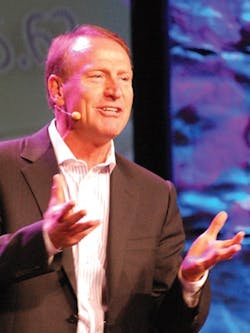Presently the CEO and cofounder of Virgin Unite Mentors, Thompson is the New York Times best-selling author of Success Built to Last.
He was the guest keynoter at Monday morning's general session at the Emerson Global Users Exchange 2013.
"How can you take industries that suck, and find the great performers in them?" Mark Thompson on the lessons he's learned from studying and working with some of the world's most respected business leaders.
"How do you take existing tech companies and service organizations and reinvent them? How can you build organizations that can grow through crises, chaos and disruptive change, and become 10-times-better producers (10x) compared to their competitors?" asked Thompson."How can you take industries that suck and find the great performers in them?"
Working with Stanford University's Venture Design Labs, Thompson reports he helped study data from about 27,000 companies in 100 countries over 20 years to identify the characteristics of those that can seize opportunities, even when their beset by otherwise debilitating problems, and go on the become those 10x producers. He says that every "10xer" has four main leadership methods for staying in control in an out-of-control world:
- Maintain a fanatical discipline and devotion to detail and quality.
- Don't just be productive. Be paranoid as well, but don't be frozen by it.
- Be empirically creative. Make decisions that will move your process forward, but still work to make it stable.
- Try to develop Level 5 leadership, which means be ambitious, but maintain humility.
Read Also: Emerson Refocuses on the Human Experience
"You have to blend relentless creativity with the discipline to achieve great results," added Thompson.
Thompson reported that a good leader's "fanatical discipline" includes asking other people for advice and finding and motivating the right people and project managers. This means looking for people that are passionate about what they do, helping them find and perform a job they can strive to be the best at, and helping them to drive their own economic engines.
"Apple is often perceived as all Steve Jobs, but he actually invested in a group of brilliant engineers and other people over the years. And they've been able to carry on after he's been gone. Leaders must be willing to realize that success is all about the people they're working with, and that we can never succeed just on our own."
Another crucial leadership skill and productivity enhancer is to develop and build trust, Thompson says. "Trust is under-promising, over-delivering and exceeding expectations. It's also consistency, admitting when you're wrong and being willing to make it right. "For example, Sir Richard Branson wanted to reproduce the experience of Southwest Airlines. So Virgin Atlantic started out with one airplane, but then on its first flight, with all of the press attending, one of its engines exploded. Despite this setback, both Virgin Atlantic and Virgin America have gone on to be successful airlines."
About the Author

Leaders relevant to this article:




